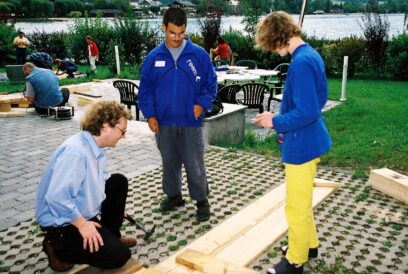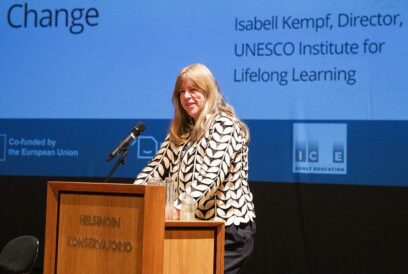

“The “learning prison” concept emphasises learning as a rehabilitative activity, as opposed to the more common approach of “work as rehabilitation”.
“The “learning prison” concept emphasises learning as a rehabilitative activity, as opposed to the more common approach of “work as rehabilitation”.
Is transformative education the path to active citizenship, both old and new, for people in English and Welsh prisons?
Education can instill a sense of citizenship in one of two ways – either overtly in the content or implicitly in the way the course is delivered. So if we want to encourage active social engagement, it follows that we need an engaged classroom.
This is no less true in the context of prison education.
The UK Ministry of Justice’s policy paper Prison Safety and Reform, released in November 2016, placed an emphasis on employment. Any mention of education for prison inmates was linked to job opportunities. The importance of work at both an economic and personal level cannot be denied. However, social engagement requires more than a job title.
Social engagement requires skills which are part of our increasingly fluid, open and digitally mediated form of social arrangement. Moreover, it requires acknowledgement of the learner’s experience – in this case the prisoner-learner.
Seeing the whole person
This is where transformative learning could step in. This learning principle recognizes the learner as a whole person, inviting their experience and expertise into the teaching mix. When a learner’s agency is acknowledged, it is a short journey to their engagement because agency implies engagement.
Educators, policy writers and ex-prisoners agree that a transformative approach is beneficial. Dr Anne Pike from the Open University has researched the question of transformative learning in prison education. Her doctoral thesis was the first longitudinal study in England and Wales of prisoners who had participated in higher learning before release.
One particular positive result was the sense of learning community formed in so-called ‘learning prisons’, which are prisons in which the staff support education as a means of rehabilitation. The term is used to contrast these prisons from ‘working prisons’, where work is perceived as the main rehabilitative tool.
The learning prison community empowered learners to take responsibility for their education. Dr Pike argued that the learning community could flow into the rest of the prison, which mirrors the foundation for the type of engagement championed in this new form of citizenship, providing there was support from the prison governor.
Indeed, the increased independence of governors to implement educational policies is one of the recommendations in Dame Sally Coates’ review Unlocking Potential: a review of education in prison. All the people I spoke to, including Dr. Pike, saw decentralisation as a positive step as it would allow governors to respond to the particular needs in their own prison.
Dr. Pike added that the benefits from education do not only have to be limited to higher learning. Education whether vocational or higher has the potential to rehabilitate prisoners. What matters is how individualised it is.
“Any form of education that improves a person’s sense of self-esteem and feeling about themselves is good,” she said.
Nina Champion, Head of Policy at the Prisoners’ Education Trust, a body which not only funds learners in UK prisons to enrol in distance courses but engages in research and advocacy work, reinforced the importance of recognizing the individual. Education to be effective has to tap in to what interests the individual. Furthermore, it bears results.
A report from the Justice Data Lab, part of the Ministry of Justice, compared reoffending rates of those who had received Prisoner’s Education Trust grants against a control group. There was a reduction of 4-8% for those participating in academic courses and 6-9% for those in vocational courses.
Champion was reluctant to conclude whether higher versus vocational education was more effective in reducing reoffending rates. “It’s not necessarily the subject matter or the course matter that’s really the issue. It’s more about how it’s delivered and the context and culture in which its being developed,” she said.
Citizenship starts in the classroom
Speaking with Ms. Champion, one got the impression that teacher-centred, secondary school style education was not so effective in capturing learner interest in prison. Moreover, once given the opportunity and recognised as individuals, prisoner learners became actively engaged through expressing complaints and making recommendations. In essence, they found their “learner voice”.
“That’s really for me what citizenship is about – feeling that if there’s something wrong you can try to change it,” she said.
A similar observation was made by Jose Aguiar, an educator at HMP Pentonville. One project in which both Mr. Aguiar and Ms. Champion were involved was the Rehabilitative Cultures Project, which ran until 2015. The project surveyed both prisoners and staff. After the survey, Mr. Aguiar facilitated staff training sessions which promoted the idea of learner voice. The aim was to encourage greater interest in education among prisoners. Mr. Aguiar also saw it as promoting social engagement.
“One of the aims was to create better relationships in prison and for prisoners to develop their social skills, or their citizenship skills, if you like, while in prison and obviously transform them to the world outside,” he said.
Projects such as this one, or PET’s “Involve, Improve, Inspire”, a toolkit designed to encourage involvement in education through greater representative and communication, the student council at Wymott Prison, are steps toward active citizenship. Currently, for the broader prison population, citizenship is more likely to be encountered under the rubric “British Values”, which focuses on democracy, human rights, diversity, equality and respect for the law.
Aguiar, who currently teaches enterprise skills at Pentonville, felt that rather than teaching “British values”, embedding citizenship into other subjects ensured more learners in prison were exposed since the topic was not relegated to a single subject. However, he did feel more could be done.
“In prison we could have that chance, while they’re there, to develop those skills and knowledge about how society works, what glues us together,” he said.
Inmates should securely be allowed online
The potential for engagement can get stuck in the reality of prison. According to 2015 data released by the UK government, 46% of prisoners had literacy skills equivalent of a primary school student. Prisoners can be moved around, disrupting their experience of education. Moreover, one of the key aspects of engagement – computer access – is not universal inside prison walls.
Both Ms. Champion and Dr. Pike reiterated how important computer skills were to future employment. They are as essential as basic literacy and numeracy. Unlocking Potential devoted an entire chapter to how digital, or ICT, skills are imperative to both employment and social engagement. As Ms. Champion states, ICT skills are the “third basic skill” along with literacy and numeracy and are important for “employment and just living life”.
Security, while an understandable concern, is ensured through the logging of keystrokes. Both Ms. Champion and Dr. Pike stated digital communication could be more closely monitored than handwritten letters. According to a PET survey of governors, the majority of governors surveyed believed that prisoners should have “secured, controlled access” to the Internet.
Computer kiosks are one way of allowing prisoners to digitally manage their lives. The project Virtual Campus provides secure computer access in 105 of prisons in England and Wales. Through the Virtual Campus, learners are able to contact tutors and complete academic work, though wider electronic access is restricted.
Beyond the Gates
If the educational gains made in prison are not nurtured after release, society won’t see the rehabilitative benefits and the prisoner-learner won’t have the chance to engage socially or achieve his/her potential.
“If they [ex-prisoners] don’t get continued support, what can happen is that they can fall back through the cracks,” said Chris Syrus.
Mr. Syrus is the founder and director of Syrus Consultancy. Through his company, he organises workshops for schools, community groups and organisations working with young offenders. These workshops combine creative writing, music recording and video production to encourage greater self-awareness. This is surely one of the key ideas of transformative learning.
“I naturally came about it sitting in my cell,” he said of his own transformation while inside, which eventually lead him to a degree in Psychology through the Open University. Other people in prison may not have the opportunity given the disruptive nature of incarceration. For this reason, workshops which promote self-awareness are crucial.
Peer-mentoring, where released prisoners are coached by ex-convicts, is another tool to ensure the frustration of post-release doesn’t lead people to re-offend. Peer-mentoring isn’t perfect and approaches may vary, but it is a means of connecting an ex-prisoner with society and building on the gains made in education.
Mr. Syrus stated that the role of peer-mentoring was especially beneficial in comparison to probation. The authority of a probation officer may create a disconnect since the officer could send a person back for coming late to a meeting.
“You cannot punish and coach at the same time,” he said.

Chris Syrus turned his life around. Photo / Chris Syrus’ personal archive.
Building Connections
Moreover, mentoring engenders social connection. It’s a moment in which people are identifying one another – their fellow citizens if you will. And mentoring inspires others to mentor, so these connections can build over time.
“It definitely has a ricochet effect,” Mr. Syrus said. “If you mentor 10-20 individuals, half of them, if they didn’t know what they wanted to do before, may decide this [mentoring] is really good.”
Nick London, who obtained a 1st class degree in Criminology and Psychology while in prison, equally identified peer-mentoring’s potential to forge social bonds. He likened it to a trickle-down effect.
“The best mentors are those who have been mentored,” he said. And he should be speaking from experience since he is the Director of Platforms, a creative community which provides opportunity, support and frameworks for effective rehabilitation through peer led mentoring.
London’s concern was that a focus on learning outcomes can ignore the more complete transformation possible through education.
For him, the real gains of education came from recognising the personal gains through anecdotal reports and not simply measuring quantitative gains. This means more than ensuring that certain outcomes are achieved. The journey of the person has to be seen and only then can an educational program be deemed successful.
Going further, he identified communication skills as crucial. They didn’t only allow a person to interact with authorities. It allowed them to articulate who they are. From his experience, the communication of people inside was at a low level, reduced to a binary expressions of “I feel shit; I feel good.” Developing communication skills, especially through art, can enable this whole person to be realised.
At the heart of all of these discussions was the view that recognition of the person was key. It could be empowerment through education structures or a simple sense of trust, which Mr. London stressed had results because most learners wanted to maintain the benefits of education.
“If you give people responsibility, they’re likely to take it,” he said.
New theses for prison education
- Education can build a sense of community;
- Learning needs to be as individualised as possible;
- Citizenship is a necessary skill like literacy and numeracy;
- ITC skills are necessary for employment and general living;
- Computer access can be delivered in a safe and secure way;
- Those with first-hand experience of prisons, i.e. former prisoners, can help mentor others.
Projects and documents mentioned in the article
- UK Ministry of Justice: Prison Safety and Reform
- Dame Sally Coates: Unlocking Potential: a review of education in prison
- UK Ministry of Justice, Justice Data Lab: Re-offending Analysis: Prisoners’ Education Trust
- Prisoners’ Education Trust: Rehabilitative Cultures
- Prisoners’ Education Trust: “Involve, Improve, Inspire” Toolkit





